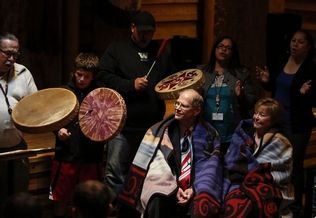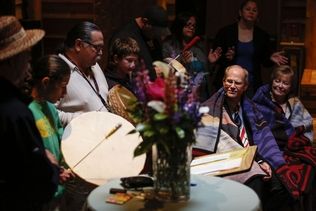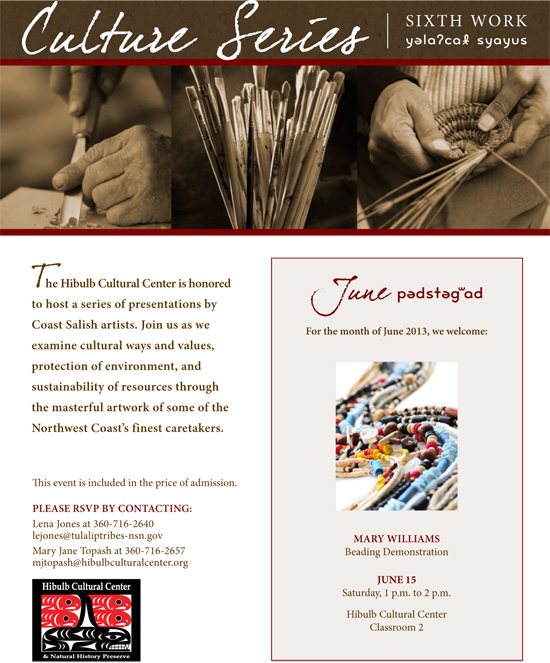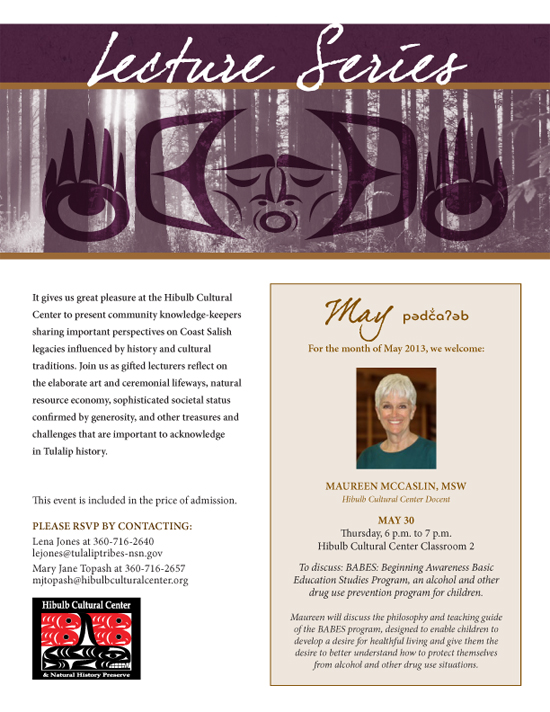Tag: Hibulb Cultural Center
Open Mic Poetry Reading at Hibulb, Nov 7
Beading Demonstration at Hibulb, June 15
Retiring Marysville superintendent got schools back on track

Marysville School District Superintendent Larry Nyland and Assistant Superintendent Gail Miller listen to songs by the Tulalip Tribes during a retirement party at the Hibulb Cultural Center on May 30. Both school officials are retiring.
By Gale Fiege, The Herald
MARYSVILLE — No matter what side they were on in the fall of 2003, most people agree that the divisive 49-day teachers strike in the Marysville School District took a toll on the community.
When he started in the summer of 2004, then-new Superintendent Larry Nyland set out to meet individually with more than 700 people. His first goal, he said, was to “restore relationships.”
Many of those in attendance at Nyland’s retirement reception May 30 at the Hibulb Cultural Center talked at length about Nyland’s work to heal the district and to get results from the school board, the administration, the teachers, the district’s 11,000 students and the people of Marysville and Tulalip.
State Rep. John McCoy, D-Tulalip, said he always appreciated Nyland.
“When Larry got here, it was the right time,” McCoy said. “He was successful at calming things down and getting the district back on an even keel.”

Marysville School District Superintendent Dr. Larry Nyland and Assistant Superintendent Gail Miller listen to songs by the Tulalip Tribes during a retirement party at the Hibulb Cultural Center on May 30. Both school officials are retiring.
In his role in the state Legislature, McCoy said he heard frequently from Nyland regarding school funding and other issues.
“Larry had no problem telling me what was on his mind, and I like that,” McCoy said. “I hope our new superintendent is outspoken, too. She can call me anytime.”
Becky Cooke Berg is scheduled to start her new job as superintendent of Marysville schools on July 1. Berg, who has a doctorate in education, is moving here from her job as the superintendent of the Deer Park School District near Spokane. A meeting to give the public a chance to meet Berg is set for 4 to 6 p.m. Monday at the school administration office before the regular school board meeting.
Nyland, who served nine years in Marysville, said his last days with the school district this month are “bittersweet.”
“It’s time to hand the job off,” Nyland said. “It’s been a good nine years.”
Most of the Marysville high school graduations are over for the year. Nyland said he is proud that the graduation rate in the district rose 20 percentage points during his tenure.
“My passion is student learning and I think we’ve had notable achievements in the past nine years,” he said. “It’s not just about better test scores. It’s about the skills students take away when they graduate.”
Nyland began teaching in 1971 in Gig Harbor and served as a superintendent in Alaska and elswhere in Washington before taking the job at Marysville.
Under Nyland, voters began passing school levies again, and in 2006 they approved a $120 million bond package in 2006 that helped build Grove Elementary School and Marysville Getchell High School. In 2007, Nyland was named the state’s superintendent of the year.
Assistant Marysville Superintendent Gail Miller also is retiring at the end of this month after nine years with the district.
“There was no better superintendent to work with and no better place to end my career than with Larry in Marysville,” Miller said. The Tulalip Tribes hosted the reception for Nyland and Miller, and Tribal Chairman Mel Sheldon served as the master of ceremonies.
“Gail and Larry brought to the table compassion and an understanding of the tribes,” Sheldon said. “They were team players, and we are eternally grateful for the relationships that were made.”
Arden Watson, who has served as head of the teachers union in Marysville, said that from the start Nyland had a clear desire to work with teachers and all staff of the district.
“We haven’t always agreed on everything, but we worked collaboratively,” Watson said.
School Board President Chris Nation said Nyland stood by the board and made Marysville a better district.
“At a time of turmoil and mistrust, Dr. Nyland got us back on track,” Nation said. “We aspire to be like Larry.”
Marysville Mayor Jon Nehring said the partnerships between the school district, the tribes, the business owners and the city to benefit students were encouraged by Nyland.
“Because there is no bigger priority than our children,” Nehring said.
Dedication of interpretive panels Wednesday in Everett
-The Herald
The public is invited to a dedication at 5 p.m. Wednesday of three interpretive panels depicting the early culture and history of the Snohomish peoples at Legion Park Bluff, 140 Alverson Blvd., Everett.
The late Hank Gobin and staff at the Hibulb Cultural Center in Tulalip provided source material for artist Jim Englehardt’s renditions of life on Port Gardner and the Snohomish River and estuary.
This project is a collaboration between the Northwest Neighborhood Association and Historic Everett. It was funded by the Tulalip Tribes, the city of Everett Parks Department and Cultural Commission.
Hibulb Lecture Series Presents Maureen McCaslin, Tonight
Tulalip Tribes’ cultural director lived for preservation

Hank Gobin, museum director at the Hibulb Cultural Center, listens at the grand opening of the center in Tulalip.
By Bill Sheets, The Hreald
TULALIP — Hank Gobin lived to see his dream come true: the creation of a museum to serve as the focal point of local tribal history and culture.
Gobin, 71, cultural resources director for the Tulalip Tribes, passed away Thursday — a little more than 1½ years after the Hibulb Cultural Center was dedicated in August 2011.
While the museum may be the most tangible testament to his legacy, his role in preserving tribal culture runs much deeper, tribal members say.
“Our community mourns the loss of a truly great man,” Tulalip Chairman Mel Sheldon said in a written statement.
“He was a prolific artist, activist and traditional scholar, who worked in the areas of art, education, language revitalization, museum studies and traditional foods research.”
Gobin was a force in starting the tribes’ cultural resources program in the early 1990s. This included a program to teach Lushootseed, the Puget Sound tribes’ unwritten native language, to help save it from extinction.
“He was one of the key advocates who pushed for the creation of the Lushootseed program,” said Natosha Gobin, a language teacher for the Tulalips.
The language program has grown from its fledgling origins to a year-round course in Montessori school, along with kids camps in the summer and an annual eight-week workshop for families.
“He’s always been a huge advocate for cultural preservation and bringing it all together,” Natosha Gobin said.
Her father, the late Bernie Gobin, was Hank Gobin’s first cousin.
“It was a hard loss,” she said of Hank’s passing.
Henry Delano Gobin was born in 1941 and raised on the Tulalip reservation. He left at age 21 to pursue an education and studied art at several colleges in the West, including the Institute of American Indian Arts in Santa Fe, N.M. and the San Francisco Art Institute. He received a master’s degree in painting at Sacramento State University and later taught art and ethnic studies.
Gobin returned to Tulalip in 1989 and quickly began working on preserving tribal culture, including pushing for the museum. Finally, after a long haul, the tribal board in 2005 approved the building, which opened in 2011.
Gobin used his artistic talent and education to closely supervise the design of the cultural center. The day the $19 million building opened, Gobin recalled a conversation he’d had years earlier with the architects.
“One of the things I want you to do,” he told them, “is to capture the light.”
The 23,000-square-foot building’s main corridor is equipped with skylights. The museum houses traditional tribal cedar baskets, tools, clothing, canoes, totem poles and other items, some of them hundreds of years old. Many of the items had sat stored away in people’s homes on the reservation. Lectures and other programs are held at the cultural center as well.
The museum’s grounds at 6410 23rd Ave. NE are home to a native plant cultivation and harvest program in which young people learn traditional tribal culinary ways.
“I think it’s an exciting time for the Tulalip Tribes and Tulalip people,” Gobin said shortly before the museum’s opening.
Gobin also was instrumental in reviving the annual tribal family canoe journey and setting the traditional protocol for the event, according to an obituary issued by the tribes.
“His spiritual beliefs were a prominent aspect of who he was; and it was this spiritual way of life that enabled him to carry out his responsibilities to protect his people’s cultural and environmental interests,” the obituary read.
“Everything about Hank was genuine and his magnetic personality touched the lives of all those who he crossed paths.”
Gobin is survived by his wife, Inez Bill-Gobin; two sisters and three sons. Services were held Monday.










